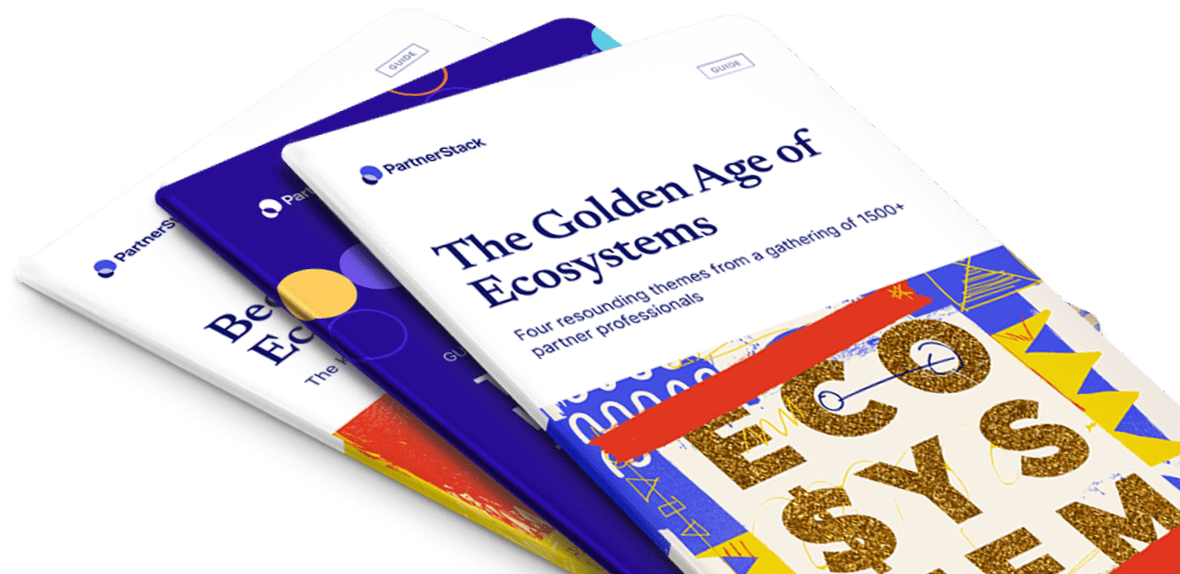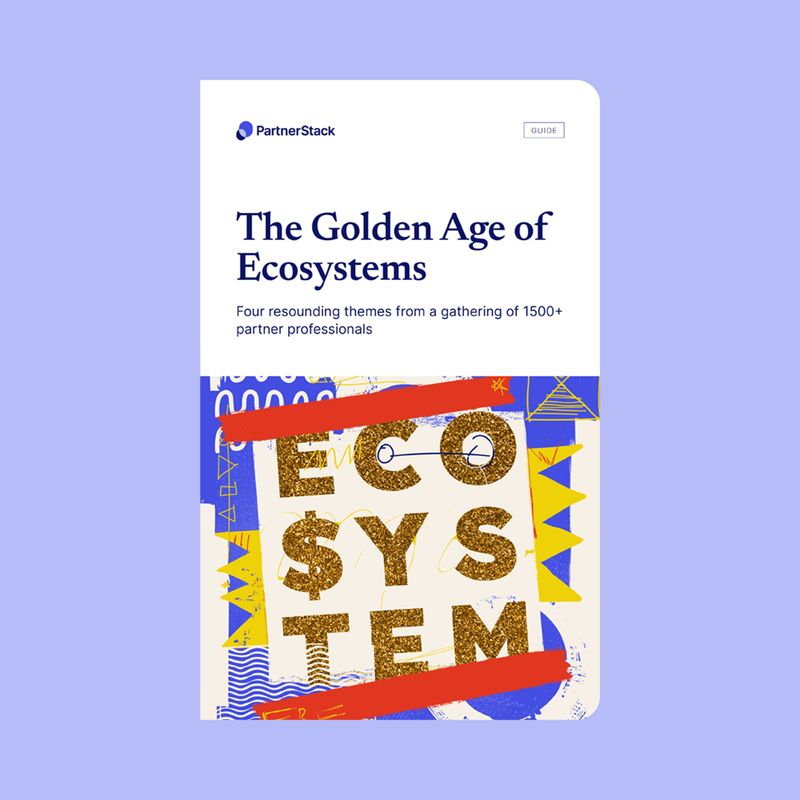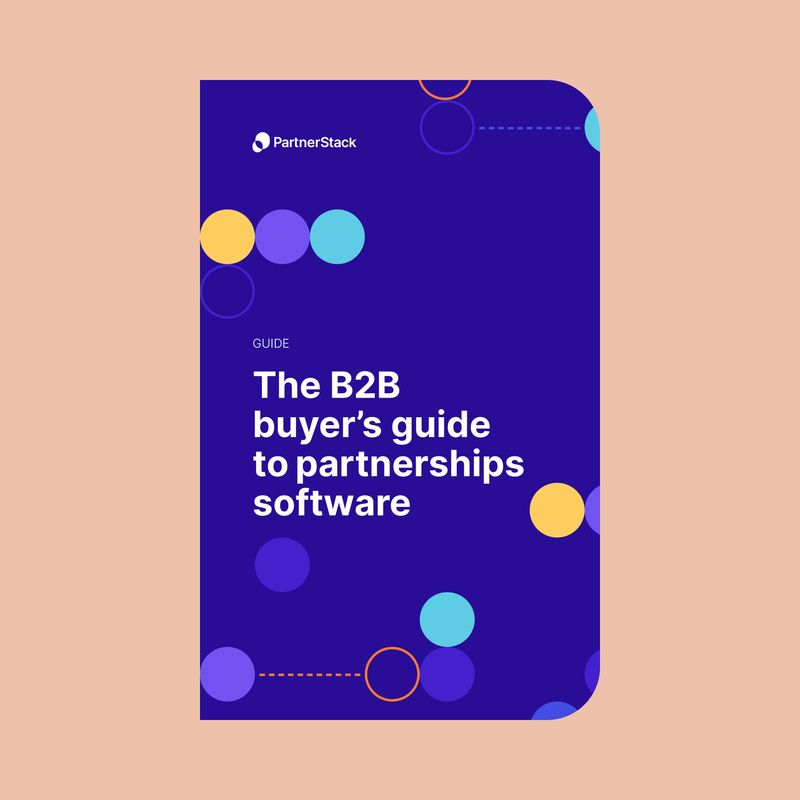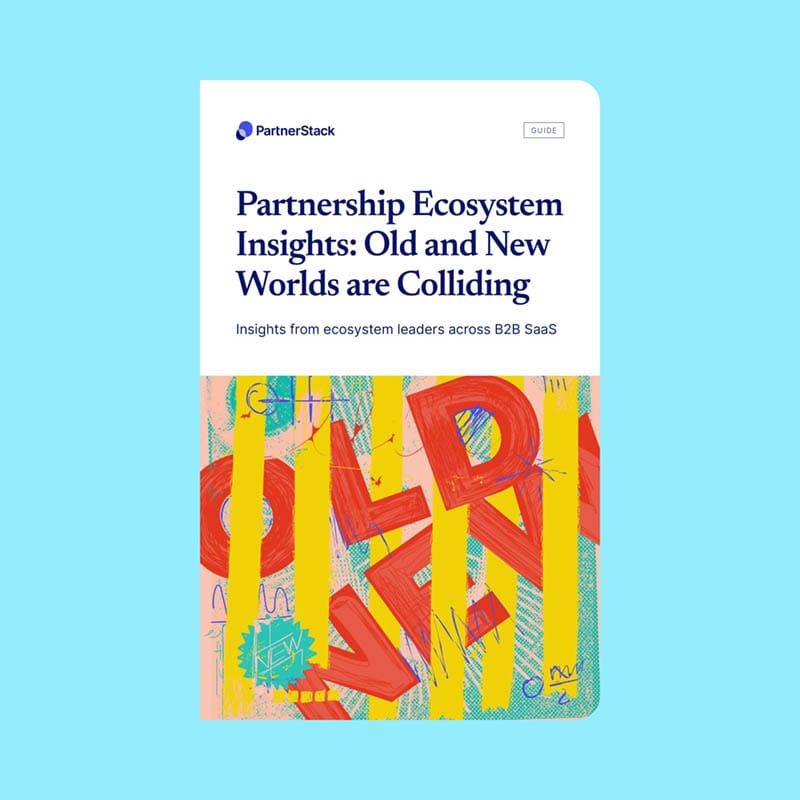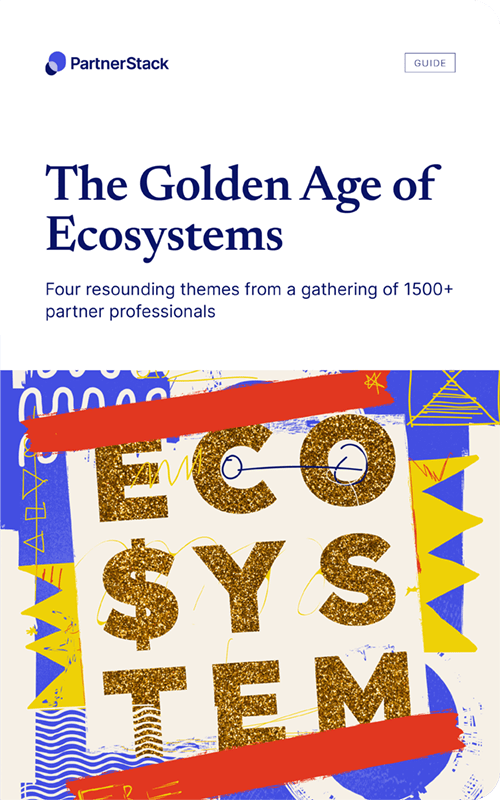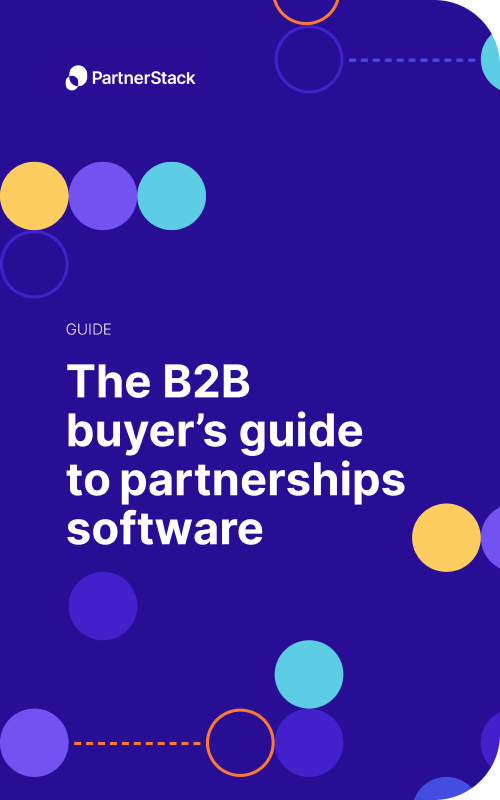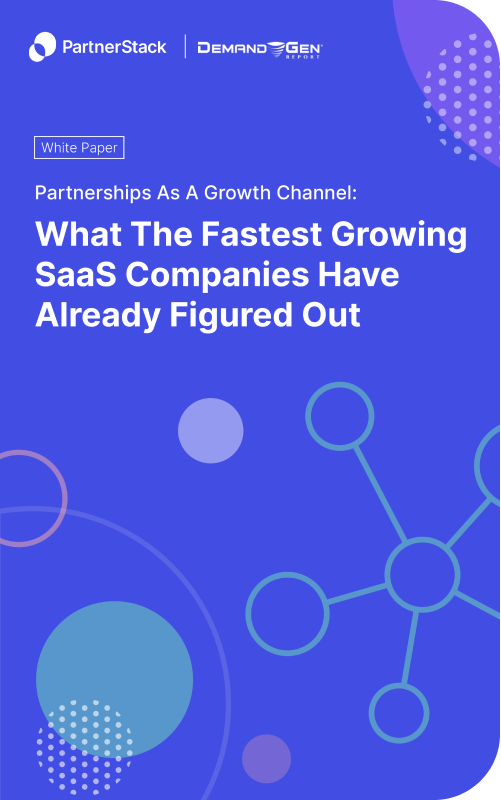Chances are when you were asked in kindergarten what you wanted to be when you grew up, you didn’t say, “I want to manage partnerships for a B2B organization.” You probably said you wanted to be an astronaut or an artist or a vet.
For the majority of partnership leaders, it’s a career path you stumbled onto accidentally. As you progressed through a career in sales or marketing, you may have peered at an adjacent trail called partnerships. Upon considering that it’s a burgeoning strategy and a mint opportunity to efficiently grow revenue (not to mention a lucrative career path), it probably seemed like a no brainer to make the switch.
But as a nascent discipline, there’s no guidebook. There’s no map to follow to achieve your career goals and grow into your full potential as a partnerships leader. That’s why we at PartnerStack created a new model for partner leaders to self-reflect on their value and chart the next phase of their career growth. We call it: the T-shaped ecosystem leader.
What is a T-shaped ecosystem leader?
The concept of the T-shaped ecosystem leader is similar to a management term from the 1980s, the T-shaped person. It posited that the most successful employees were the ones who had one deep area of expertise, but functional knowledge in a handful of adjacent disciplines. This type of skillset is also known as the “generalizing specialist”.
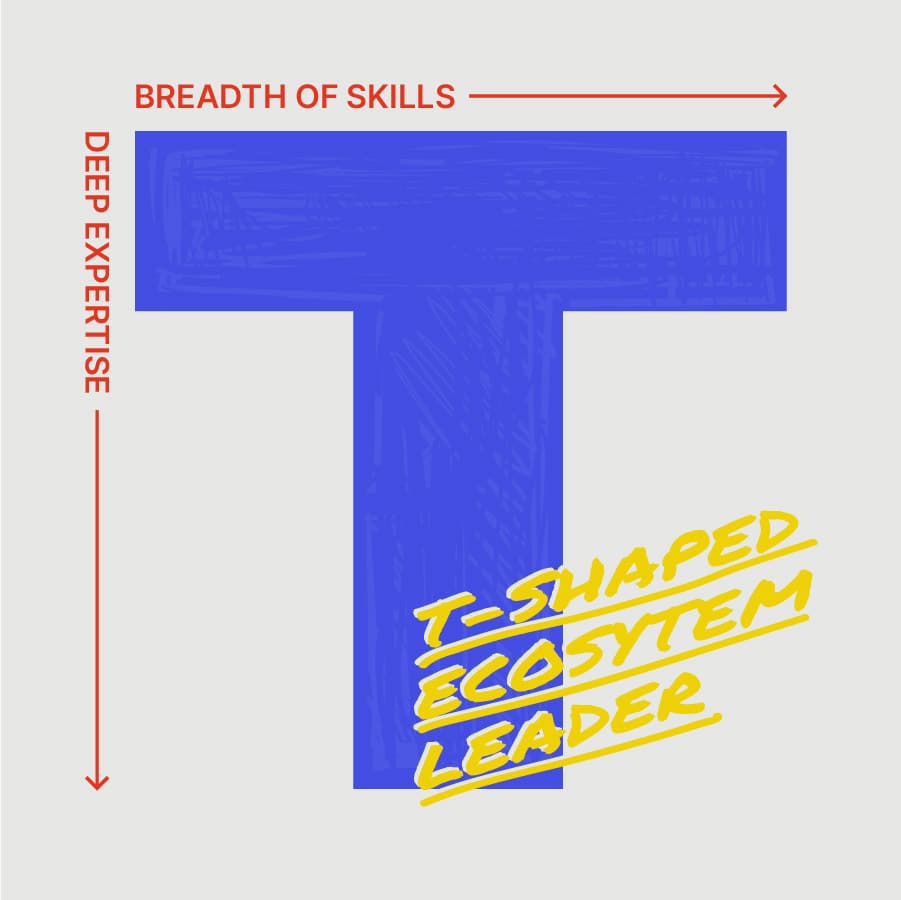
The social media platform company Buffer, for example, intentionally hires “T-shaped marketers”. One member of their team is a content marketer whose CM knowledge goes deep, but also knows a thing or two about PR, social, and email marketing. Another is a PR lead who has some background in business development and could throw together an email campaign in a pinch.
While this concept is decades old, the T-shaped employee has new significance for today’s workers. Over two years into pandemic and with some precarious economic factors, businesses are in a tough spot. They need workers who bring deep expertise but can also fill in certain adjacent areas to see the organization through tough times. T-shaped employees are extremely valuable to businesses because of their flexibility.“As a futurist who’s helped organizations anticipate change for nearly 20 years,” writes Lisa Bodell for Forbes, “I’ve witnessed the evolution from hiring employees who are specialists to recruiting those who are generalists. I believe we’re now on the cusp of a hybrid model where the most valuable employees are interdisciplinary.”

Get free ecosystem advice
Unveiling the T-shaped ecosystem leader
The old concept of T-shaped marketers is what leads us to the modern concept of T-shaped ecosystem leaders. Using the attributes of a T-shaped person, we’re focusing on applying that idea of cross-functionality to our network of business partnerships — our ecosystem. There are many different valid ways to be a T-shaped ecosystem leader, and your individual model might look different based on your skills or career path. Also, different organizations may demand different skills. What’s more, these needs will vary at different points of an organization’s growth trajectory. For example, in the early days, an organization may need a scrappy partner marketing lead with loads of creativity and work ethic, but later on they may want a tech-savvy lead who knows how to scale and automate a program using the power of partner ecosystems.
The important takeaway here is to realize that you don’t have to pick between being a specialist and a generalist. Building your skills to be “T-shaped” at the personal level sets you up to be an ecosystem leader at the business level. It also makes you extremely attractive to employers. Not only this, but it’s a satisfying guide for career growth because there’s always more to learn.
These lists are some of the top attributes a T-shaped ecosystem leader should have. Very few individuals would be a master in all of these areas. It’s common to be skillful in a handful of areas from each bucket, as well as to have a couple areas from each that are opportunities for future growth.
Top attributes of a T-shaped ecosystem leader
- Relationship-building
- Training and education
- Storytelling
- Empathy
- Leadership
- Cross-team communication
- Automating programs through technology
- Value-based selling
- Meeting sales targets
- Revenue reporting
- Community building
- Co-marketing
- Email marketing
- Webinar hosting
- Social media
- Events and tradeshows
- Messaging
- Paid ads
- Partner acquisition
- Partner engagement
- Partner conversion
- Partner enablement
- Affiliate marketing
- Referral marketing
- Reseller programs
- Distributor programs
- Tech partner programs
Self-reflection questions to ask yourself:
- What are my top 1-2 areas of expertise? (The vertical line in your “T.”)
How can I go deeper in this/these area(s) to truly master my craft? - What are the 3-6 areas where I have some proficiency? (The horizontal line in your “T.”)
Which growth areas do I want to learn more about? Consider both what’s interesting to you and what’s valued on the job market.
“Being T-shaped is important because this spread of skills gives you the versatility to work with all sorts of partners in myriad situations,” says Nikita Zhitkevich, Director of Channel Partnerships and Sales at PartnerStack. Whether you’re considering a career move to another organization or just trying to stay on top of the rapidly evolving demands of your current role, cultivating a T-shaped skill set will be a boon.
“If you want to transition from working with solution partners to reseller partners, you probably have a lot of the core transferable skills to make the switch,” says Nikita. “Even if the selling motion varies, if you have a strong basis in relationship-building and storytelling, for example, you will be in a strong position.”


“Leader” is a bit of an ambiguous term. For some, it immediately brings to mind a C-suite executive with decades of experience who manages a large team of direct reports. But leadership is a skill that anyone can have — from an entry level individual contributor to that seasoned executive.
The Harvard Business School defines a leader as someone with vision who changes the status quo. Someone creative who can tolerate risk and ambiguity, and who is bold enough to paint a picture of a future that doesn’t exist yet. Managers, on the other hand, are often folks tasked with implementing someone else’s vision, overseeing others, and solving problems that arise.
By this definition, executives can lack leadership and individual contributors can be leaders regardless of their role/title. If you’re tasked with a newly emerging partner marketing function, you’re a leader. If you’re the first (or one of the first) folks to get a new partnership program off the ground, you absolutely can and should be comfortable thinking of yourself as a leader.
Examples of T-shaped ecosystem leaders
What does a T-shaped ecosystem leader look like in practice? Here are three hypothetical examples based on a composite of many partner leaders we know.
E.G.1
Before becoming Channel Partnership Manager at a small tech firm, Rifka used to be a demand generation marketer, so she’s strong with paid ads and events. These skills perfectly set her up to run RooibosCorp’s affiliate marketing program. She was an avid reader growing up so storytelling comes naturally to her. Her company’s next frontier is to start up a referral program, so Rifka joined an online Slack community and has started asking questions about referral programs to widen her company’s ecosystem and keep building out her T.
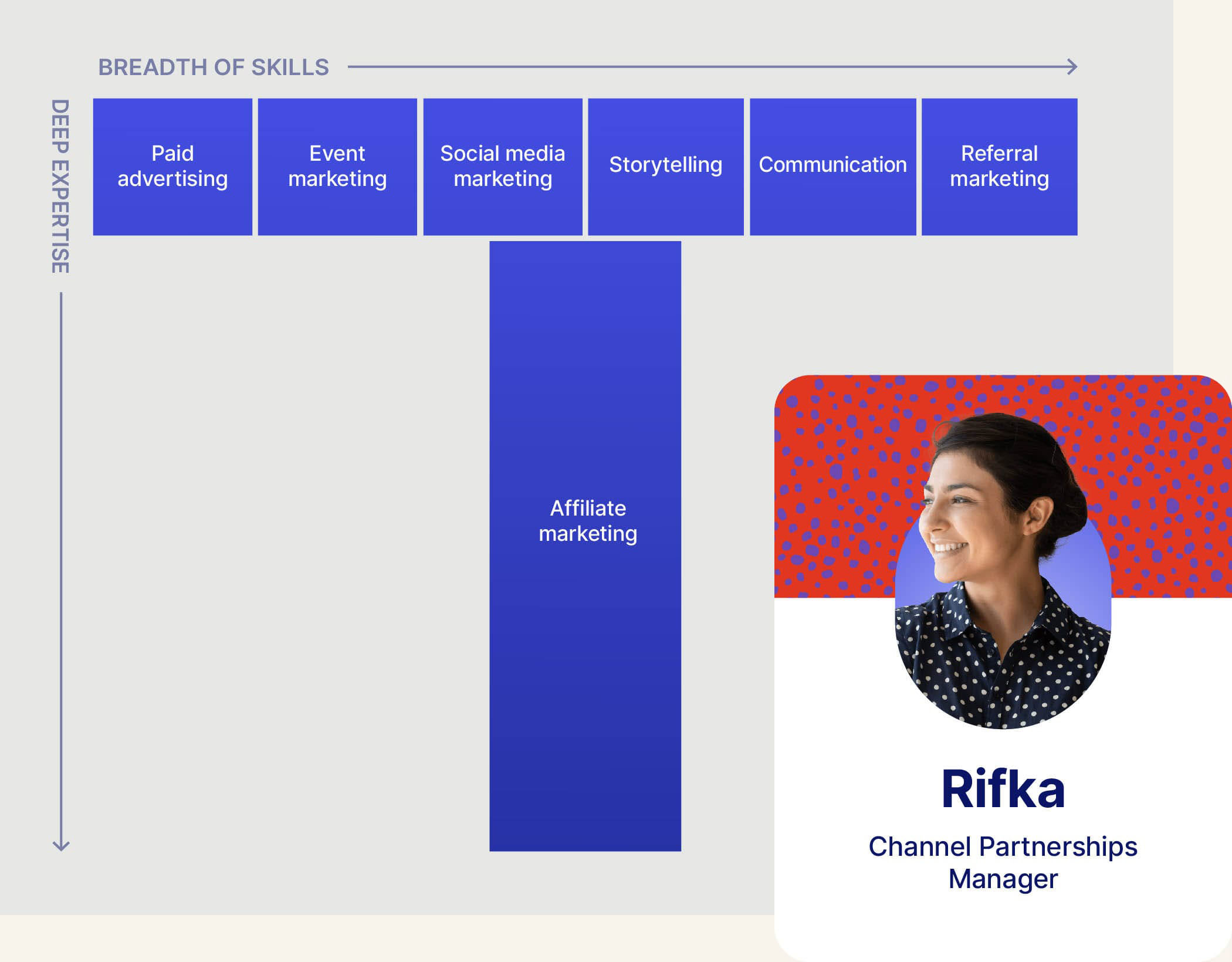
E.G.2
Rajesh is a social and affable guy. A natural salesperson, building real relationships and closing deals has never been hard for him. Now that live events are coming back, his company wants to host more partner meet-ups and sponsor more trade shows. While schmoozing at the booth is fun and easy for him, he’s learning the ins and outs of organizing live events. To strengthen his “T” he’s built up a mentoring relationship with a seasoned events marketer on his company’s marketing team proper. They have a weekly coffee chat where she imparts wisdom from her career and coaches him to run his own events, which in turn can help him grow his company’s ecosystem.
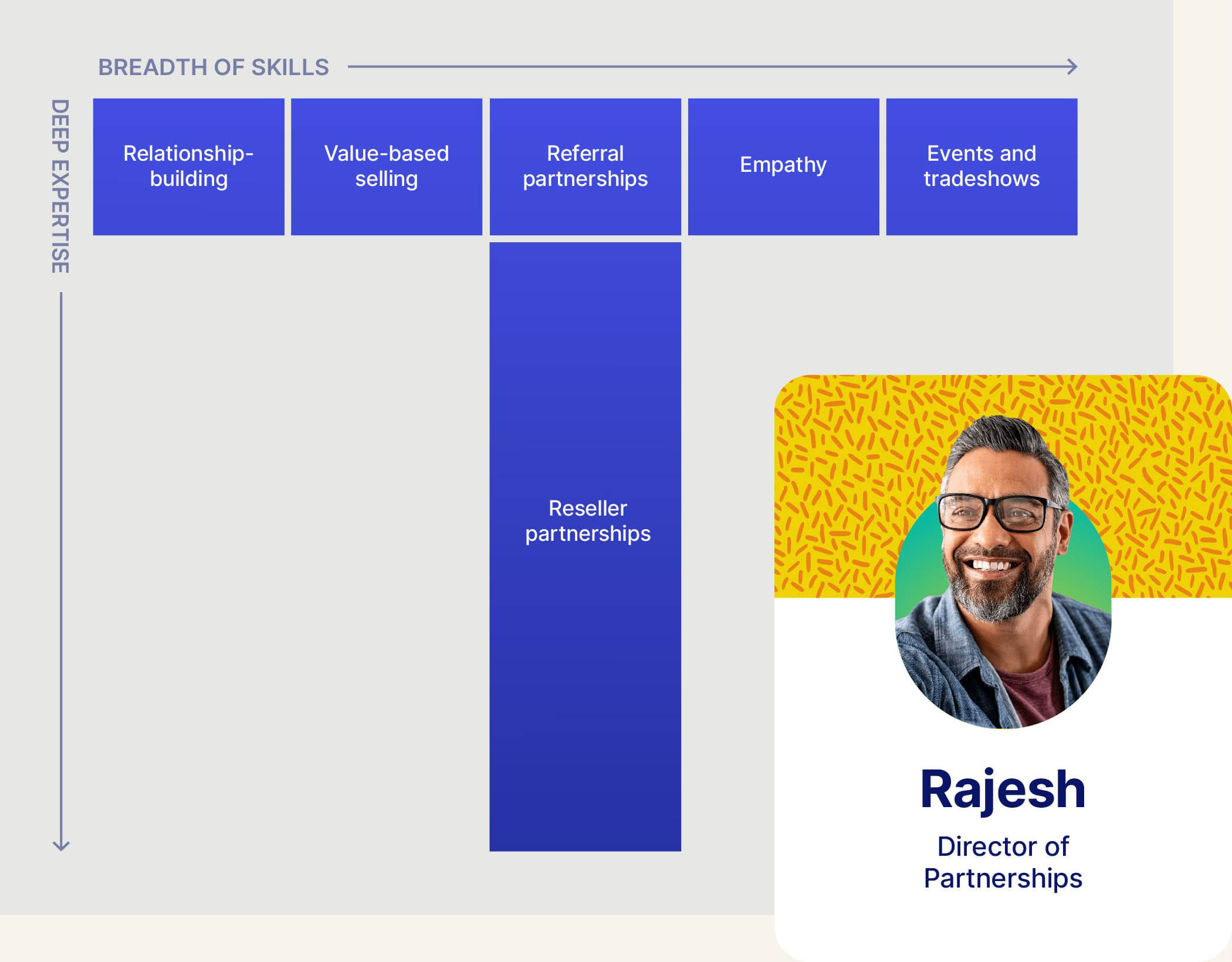
E.G.3
With 7 years as an AE under her belt, Mei grasps reseller enablement perfectly. She used to teach ballet to kids as a part-time job throughout her schooling, so she’s a natural at teaching and training others. In her past role, she ran a reseller program, but her new company has her focused on launching an affiliate program first to build up the pyramid. So she decided she needed to learn some marketing 101 skills. She decided to take a Digital Marketing course at Brainstations every Wednesday night. Through this, she’s learning how to set up paid ads, build brand awareness on social media, as well as measure and optimize the impact of all these activities. These marketing efforts help broaden the company’s reach and strengthen their ecosystem, too.
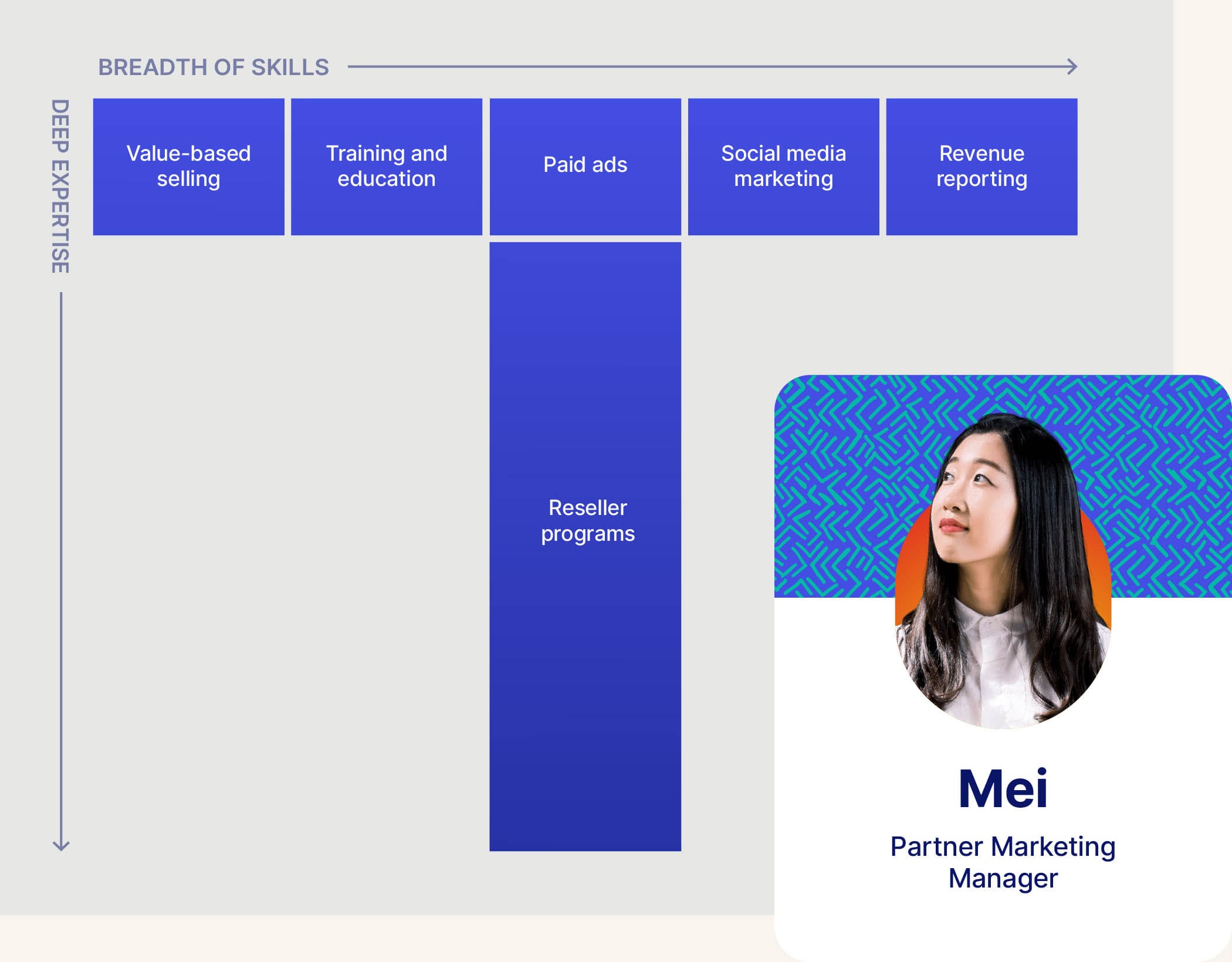
Identified some growth areas? How to deepen and broaden your skills
With a job market evolving as quickly as today’s, it’s natural and expected to notice some skill gaps when you asked yourself the self-reflection questions above. If you noticed some gaps between the partner leader you want to be and the one you are today, first of all, applaud yourself for building your self awareness — it’s the hardest part. Now that you’ve identified a gap, there are plenty of resources you can access to learn more.
- Find community. Join Slack communities like Cloud Software Association and Partnership Leaders to meet other folks solving the exact same problems you are at their organizations. Ask questions, read threads, and meet people you otherwise wouldn’t.
- Build 1:1 relationships. Met someone you have a lot in common with in a Slack group? Why not grab a coffee together—virtual or otherwise? You can discuss and compare strategies . It may just be the injection of new ideas you need to energize you and solve tough problems with a fresh perspective.
- Access free resources online. There are tons of resources out there for partner leaders who are eager to learn more. There’s the The Partnered Podcast, newsletters like PartnerHacker Daily (also known as PhD), and tons of webinars and articles via our own PartnerStack resource bank.
- Take a course. For sales training, you can check out Cerebral Selling, Sandler, Saleshood, or Challenger. For marketing training, you can think about a course via Growclass, BrainStation, Pragmatic Institute, or General Assembly.
Ultimately, building out your T-shaped skills and, consequently, your ecosystem-lead focus as a partner leader means avoiding both the pitfalls of being overspecialized as well as the pitfalls of being “a jack of all trades, master of none.” This versatility will help you in your career as the job market shifts. A fluid skillset and a wide net of business connections allows you to adapt to a great many unexpected situations.
Nikita still thinks that partnerships are a greenfield opportunity, even as other job functions face major challenges. “I don't think partner leaders are experiencing the same downturn as others, candidly,” he says. “People are now starting to understand that partnerships are an extremely efficient lever for growth. You don't need the same headcount as you’d need with a direct sales team,” says Nikita.
Since T-shaped employees are not only committed to becoming better at their core competencies, but branching out into adjacent areas, they also become better collaborators with other departments. This not only means they can play an outsize role in helping their companies weather difficult periods, but it can also mean meteoric career growth.
